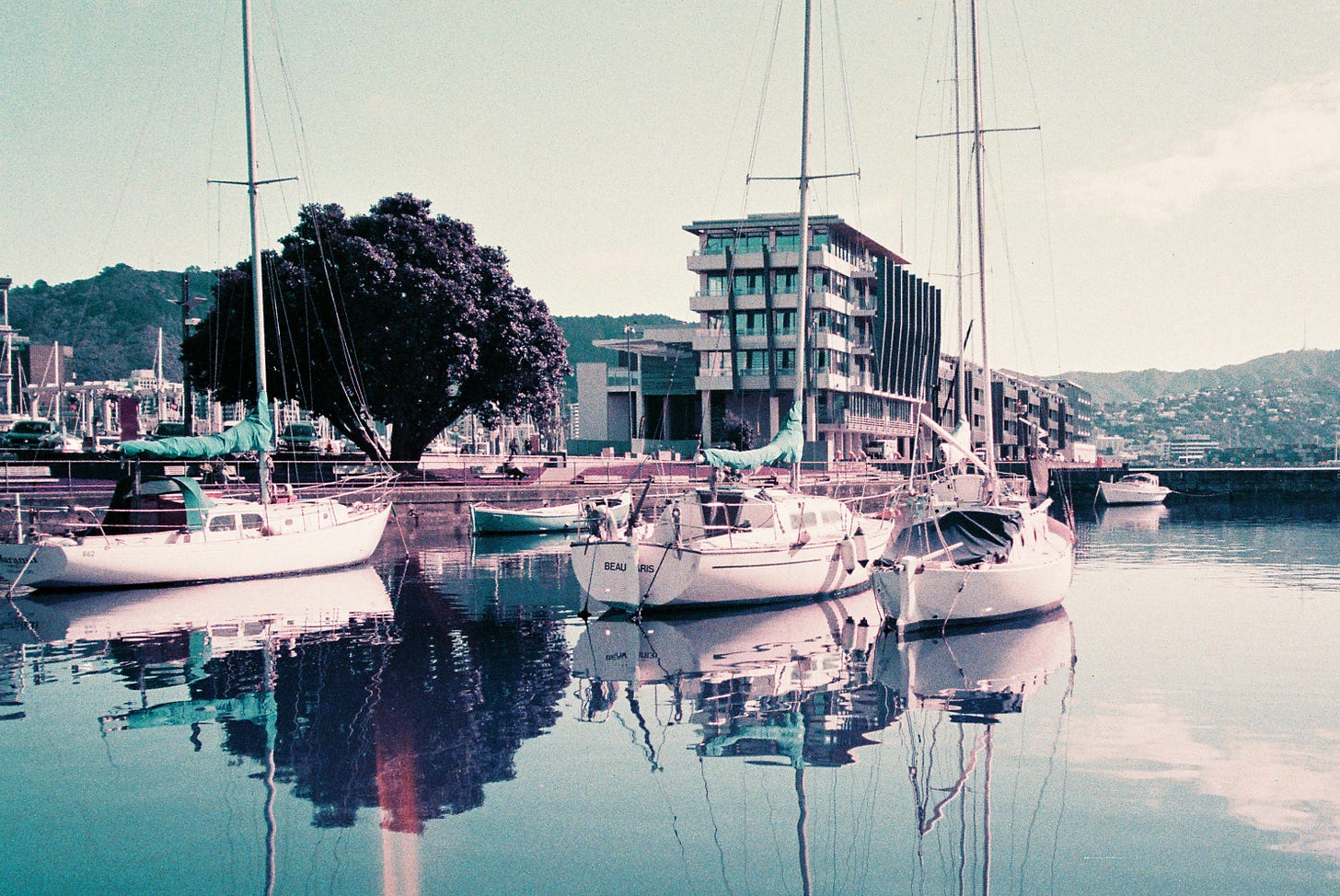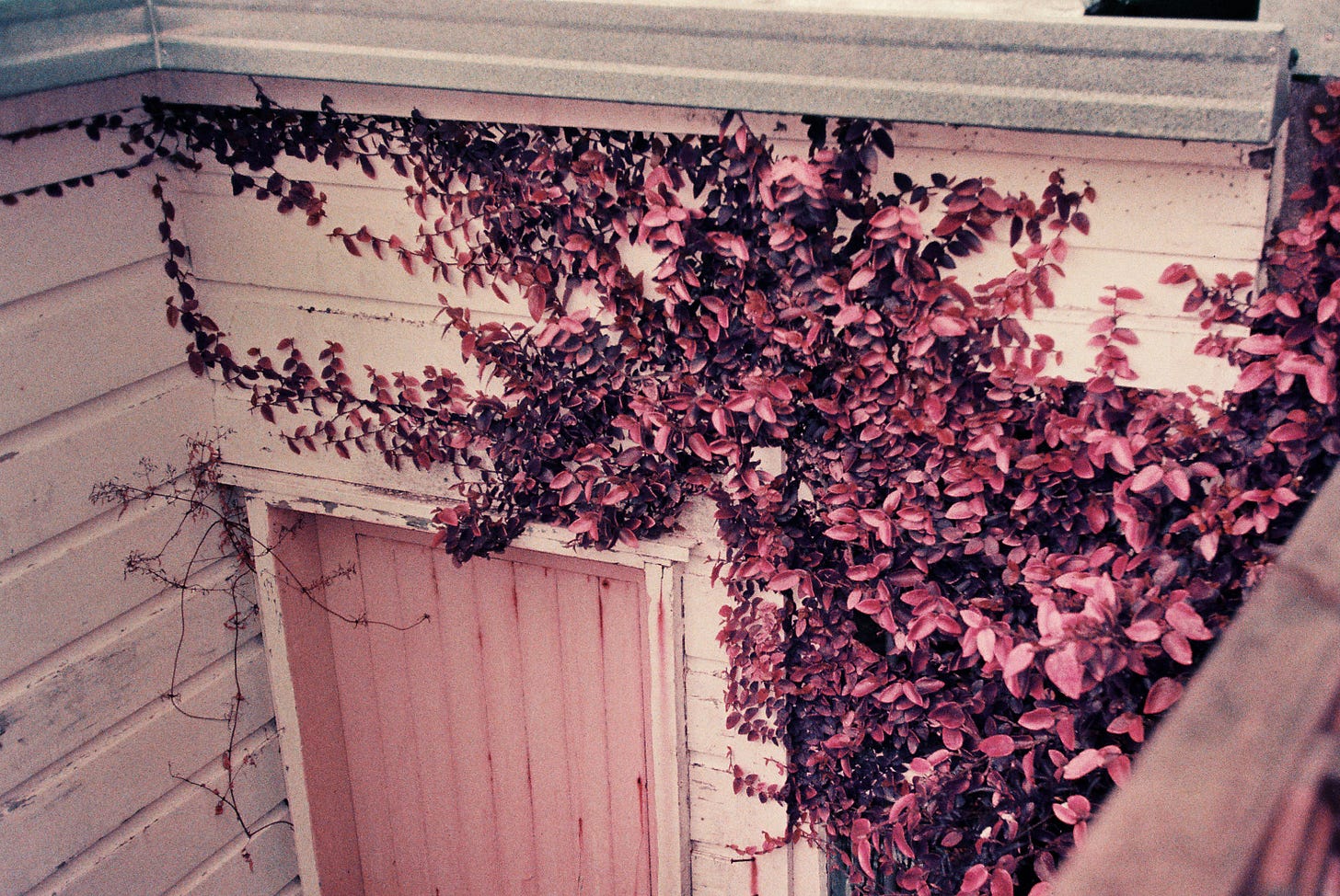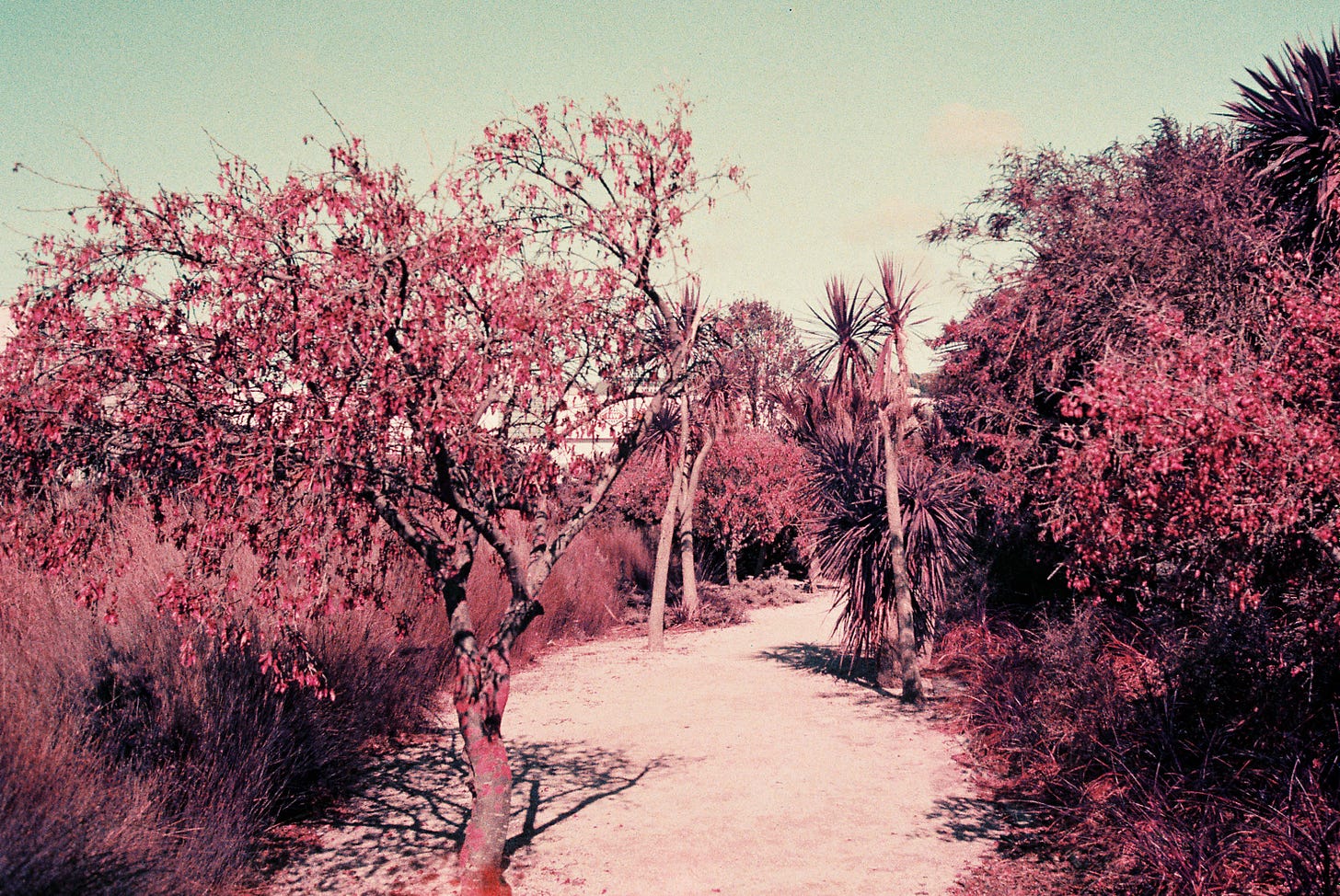Midweek Beats + Pieces vol. 13
A few listening, reading and watching recommendations + some photos oOoOoOO
It’s been another week of slowly working away on projects behind the scenes for me. Good things take time, and hopefully I’ll have some more good things to share with you soon. This week’s photographs were shot on Lomochrome Purple 35mm film with an Olympus MJU II, before being developed and scanned by Splendid Photo in Te Whanganui-a-Tara. Anyway, let’s get on with the show.
Richard H Kirk of Cabaret Voltaire passed away this week, and my guy Apiento paid tribute to him over at Test Pressing. You can read Apiento’s reflections here.
Starting on September 6, Mixmag spent a week paying tribute to South Asian artists in modern music. You can read a guide to the full content series over here.
This month’s Label of The Month on Resident Advisor is Chinabot. The intrepid, dialed in and always on-point Nyshka Chandran has the scoop here.
New York’s DJ Voices had CCL join her as a special guest on her Nothing In Moderation radio show on The Lot Radio. You can listen to the archive here.
Ban Ban Ton Ton’s Dr. Rob pays tribute to the recently deceased Takeo Toyama. A beautiful live lived to the fullest. Read more here.
WHAT I’VE BEEN LISTENING TO:
Pacific Eardrum, Self-Titled (Self-Released)
If you’re a fan of the cult Dr. Tree album, or have any interest in the idea of late 70s New Zealand jazz rock deep cuts, Pacific Eardrum’s self-titled debut album is probably right up your alleyway. New Zealand musicians Joy Yates and Dave MacRae formed Pacific Eardrum while they were living in London in the seventies, before recording the album in 1977 with a cast of collaborators who included Isaac Guillory, Jeff Seopardie, Billy Kristian and Jim Cuomo. Sliding between genres, feels and moods with the logic of a dream, Pacific Eardrums eight songs make for a rather special time.
The Limiñanas / Laurent Garnier, De Película (Berreto Music)
As far as I’m concerned, it does not get much better than this. The Limiñanas aka the best French rock band of the last fifteen years (fight me) and techno DJ/producer Laurent Garnier aka the French master of Body Music recorded an album together, and the sweet spot they landed on is everything you’d imagine and hope it could be. Apparently De Película was born from “a shared love for the German band Can, trance music, psychedelics, but also dancing and all those “genres of music that allow you to drift off,” which should give you a reasonably good idea of what to expect. Between The Limiñanas’ penchant for expressing themselves in 60s chanson-pop, garage rock, psychedelica and country blues modes, and Garnier’s deeply physical and future-forward approach to synthesis and machine rhythms, De Película’s naturalistic/cybernetic synthesis feels just perfect. The thing about ambitious crossovers is sometimes they feel effortless.
Hassan Abou Alam, It Spills EP (naive)
Cairo’s foremost breakbeat master™ returns to the naive/naivety extended cinematic universe with It Spills, a new EP filled to the brim with chopped-up drum loop programming, bleepy subwoofer thumping basslines, eerie sampledelics and early morning rave euphoria melodies. If Hassan Abou Alam’s T44 EP release through naive sublabel naivety was a telling reminder of the vitality of Cairo's experimental electronic underground, It Spills is a five-part act of confirmation. Brilliant and blinding, Hassan Abou Alam’s work is a genuine offering for true followers of the jagged edges of machine funk.
WHAT I’VE BEEN READING:
Rolling Stone: How Nite Jewel Broke Through Heartbreak, by Julyssa Lopez
The one thing that I don’t do as an artist is stick to the same exact formula. I know there are some things that are just a part of me musically that I love to include, whether it’s deep bass lines or certain melodies, but I try to challenge myself with each record. I think with my sophomore album, I had a similar idea that I had for No Sun, where I wanted to record analog and I wanted to have sequencers — I was inspired by Brian Eno, actually, where I wanted to produce in this way that felt really experimental. The record was ambitious, and I don’t think it hit exactly how I wanted it to production-wise and songwriting-wise. For No Sun, I finally got to do this vision that I’ve had for so long, which is very improvisatory, experimental, and focused on working outside of the pop formula.
The Los Angeles singer-songwriter, composer, and producer talked to Julyssa Lopez about her stunning new album ‘No Sun’ and her PhD research on Sade and Rosalia. Read the full story here.
The New York Times: When a Minivan Becomes a Music Machine, by Isabelia Herrera
This is a culture born out of a love for sound, for community — a cradle of belonging in a country that is difficult to call yours. It is an echo of the din that saturates life in the Dominican Republic, the kind that occupies street corners, homes and colmados. An inherited sonic dissent, passed down through experiences of migration.
“I just love listening to loud music. I love people watching,” Manzueta said. “And there’s definitely a source of pride there.” One of his favorite genres to play is típico, a traditional Dominican style of merengue. “I love representing my country.”
On a muggy August evening on Randalls Island, Isabelia Herrera stood in a field of Honda Odysseys and CR-Vs, tricked out with towering rows of tweeters and subwoofers. Speakers were affixed to the roofs or lined the trunks of the vehicles like light artillery, painted in canary yellows, blood reds and indigo blues. A month long investigation of Dominican sound systems and car culture. Read more here.
Bandcamp: The Best ’80s Neo-Psych on Bandcamp, by John Morrison
“We were all born or were more or less young in the ‘60s, so we grew up with The Beatles on AM radio, The Stones, and everything,” says Dream Syndicate guitarist Steve Wynn. “I think it was easy for all of us to have nostalgia—if a 21-year-old could have nostalgia about that scene.”
Led by a generation of young musicians who grew up in the wake of the psychedelic rock revolution of the 1960s, the 1980s saw a brief but highly influential resurgence of psychedelic aesthetics in rock music—but unlike the psych sound of the’ 60s, which reached mass popularity, the ‘80s resurgence was primarily limited to regional rock movements like Los Angeles’s “Paisley Underground” scene and bands like the Rain Parade, Green On Red, The Bangles, The Dream Syndicate, and more. John Morrison unpacks some of the best 80s Neo-Psych available for purchase on Bandcamp. Read more here.
Dazed: Amapiano: inside South Africa’s sound of freedom, by Nkgopoleng Moloi
“Amapiano is a vibe, a big vibe – it’s a beautiful thing to see,” says rapper and singer Manu WorldStar, when I ask him if he thinks that the country’s halting nightlife will affect the sub- culture’s growth. “Everything sounds good on piano and we’re all tapping into that energy.” For musicians such as WorldStar, the genre – which emerged in 2012 but blew up across the world over lockdown – follows a long line of South African resistance music.
The sound and streets of South Africa are changing. From Bo-Kaap to the Cape and the Limpopo River, beats are colliding, pianos are dipping, bass is breaking the ceiling. A new freedom is emerging, drawing on the country’s long history of resistance. Nkgopoleng Moloi finds out more here.
WHAT I’VE BEEN WATCHING:
HOUSE (1977), directed by Nobuhiko Obayashi
This is one of those scenarios when you really have to quote the Youtube trailer caption: “How to describe Nobuhiko Obayashi's indescribable 1977 movie HOUSE (Hausu)? Is it a psychedelic ghost tale? A stream-of-consciousness bedtime story? An episode of Scooby-Doo as directed by Mario Bava? (lmfao) HOUSE might have been beamed to Earth from some other planet.” A schoolgirl takes six of her classmates to her aunt's house in the countryside of Japan. Once they’re there, they face off with with evil spirits, a house cat and a haunted piano. Ostensibly HOUSE is a haunted house movie, but it’s also a set of metaphors and allegories. I reckon you’ll know by now if you want to watch it.
FIN.









you had me at "An episode of Scooby-Doo as directed by Mario Bava? "